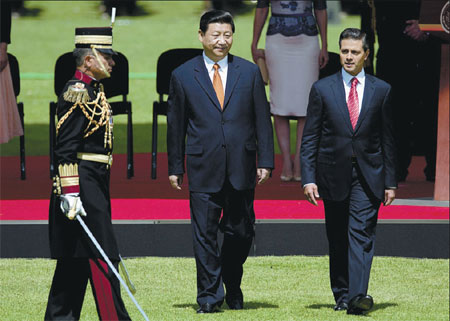Sino-Mexican relationship 'relaunched'
Updated: 2013-06-05 11:41
By Zhu Zhe in Mexico City and chen weihua in Washington (China Daily)
|
|||||||||||
|
Chinese President Xi Jinping and his Mexican counterpart Enrique Pena Nieto are pictured during the welcoming ceremony at the Campo Marte Military camp in Mexico City on Tuesday. Yuri Cortez / AFP |
China and Mexico, two of the world's emerging powers, "relaunched" a stronger partnership with the signing of a dozen agreements on Tuesday, during the first day of Chinese President Xi Jinping's three-day visit.
Xi said his meeting with Mexican President Enrique Pena Nieto has been fruitful and produced much consensus.
"Our joint announcement to elevate our strategic partnership to overall strategic partnership reflects both the reality of the bilateral relations as well as pointing to the direction of its future development," Xi told the press after meeting his Mexican counterpart.
Xi, who last visited Mexico in 2009 as China's vice-president, arrived in Mexico City after touring Trinidad and Tobago and Costa Rica, where agreements to develop ties were also signed. The agreements and Memorandum of Understanding signed on Tuesday between Mexico and China cover cooperation in energy, new industry trade, infrastructure construction, mining, trade remedy, education, banking and entrepreneur exchanges. The two leaders also agreed that Mexico will begin to export pork and tequila to the Chinese market; and China has promised to provide 100 scholarships to Mexican students each year for the next three years.
The Mexican government will set up a special trade office to facilitate bilateral cooperation.
Pena Nieto, the Mexican president, said Xi's official visit proves the two countries have reached a high level in their friendship, trust and cooperation.
He believes China and Mexico will explore more means of effective cooperation and that Mexico will attract Chinese investment for large projects, such as those for energy and infrastructure.
Pena Nieto, who took office last December, visited China in April to attend the Boao Asia Forum in Hainan province, where he met Xi.
Trade between the two countries was $36 billion last year, more than seven times the level in 2003 when China and Mexico established a strategic partnership.
Theodore Kahn, a researcher at Inter-American Bank, described Xi's visit to Mexico as a chance to "relaunch" the two countries' relations after a decade. "Both countries have something to gain by closer ties, but seizing the opportunity will require dropping long-held preconceptions about the commercial relationship," Kahn wrote in The Diplomat publication on Tuesday.
"The arrival of new leaders in both countries presents an opportunity to forge a closer, more fruitful alliance between two key emerging markets."
Kahn believes Mexico should get over its obsession with trade deficits, which he said are numbers that fail to capture the complexity of the countries' commercial relationship and obscures opportunities for more positive cooperation.
He believes that Mexico stands to gain from China's expanding foreign direct investment, particularly in the energy sector, and in Mexico's own increasingly competitive manufacturing industry, especially in wake of rising Chinese labor costs.
"Cooperation in these areas of mutual interest would give Mexico more leverage to address the trade balance issue in a pragmatic way," Kahn said. "Bilateral trade deficits are not in and of themselves a bad thing, especially in a global economy characterized by fragmented production.
"Stronger overall ties, grounded in cooperation on areas of mutual interest, will make progress on trade issues more likely."
Shannon O'Neil, senior fellow for Latin American studies at the Council on Foreign Relations, said that in the past few years, many in Mexico saw China as a competitor in international trade.
She believes Xi's visit and the agreements are an opportunity to begin changing this perception and reality, increasing trade in both directions.
On Thursday, Xi is scheduled to fly to California to meet US President Barack Obama.
R. Evan Ellis, an analyst on Latin American economic, political and security issues at the Pentagon-funded National Defense University in Washington, said Xi's visit could help transform China's relations with the region. Whereas previous Chinese leaders deferred to Latin America and the Caribbean as "America's back yard", Ellis said, Xi has been making efforts to more deeply engage his country in the region.
Discussions about Latin America aren't likely to make it onto Xi's packed agenda with Obama in California, but the fact the Chinese leader will have just arrived from a country as crucial to US interests as Mexico is a clear signal of China's increasingly confident role in the region, Ellis said in a talk at the Center for Strategic and International Studies on Tuesday.
Contact the writers at zhuzhe@chinadaily.com.cn and chenweihua@chinadailyusa.com
Joseph Boris in Washington contributed to this story.
(China Daily USA 06/05/2013 page1)
Today's Top News
EU imposes duties on solar products
China-Mexico relationship 'relaunched'
Solar duties risk China-EU trade ties
Protectionism hurts EU exports to China
China joins fight against hacking
Police advise women to 'cover up'
Beijing to have more clean-energy taxis
China's water quality 'not optimistic'
Hot Topics
Lunar probe , China growth forecasts, Emission rules get tougher, China seen through 'colored lens', International board,
Editor's Picks

|

|

|

|

|

|






